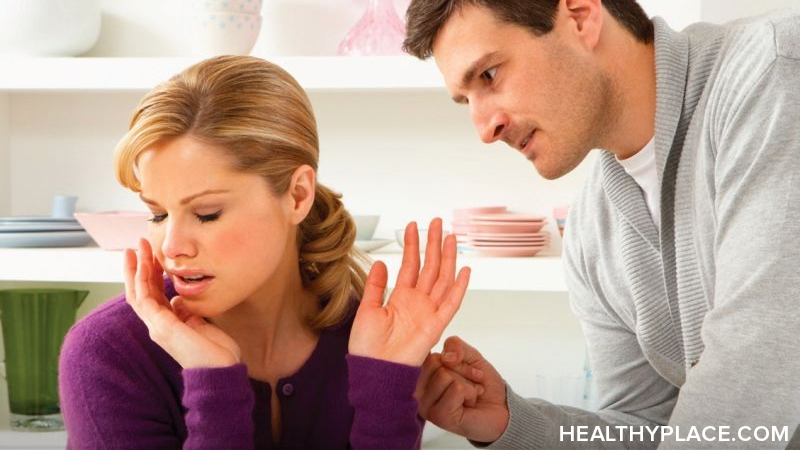How Abusive Relationships Cause Anxiety

Abusive relationships cause anxiety. In abusive relationships, one partner chooses to be cruel and demoralizing some or most of the time. This violates three of the five basic human needs described by psychologist Abraham Maslow in the 1940s: safety, love and belonging, and esteem. When basic human needs aren’t met, psychological problems arise. In the case of abusive relationships, one prominent problem is anxiety.
Many people who are or have been in an abusive relationship develop significant life-limiting anxiety. It can develop during the abusive relationship while the abuse is happening, or anxiety can begin after the abuse is over, either immediately or down the road.
What happens in an abusive relationship that causes anxiety? Let’s take a look, and then we’ll explore how to reduce anxiety caused by abuse.
How an Abusive Relationship Causes Anxiety
Abusers use a variety of means to reach their endgame—a complete takeover of the person the abusive partner is supposed to love for who they are. This violation of what a relationship between two equal partners should be is one of the causes of anxiety in toxic relationships. When the rules change at the hand of just one partner, it creates an uneven playing field that is confusing, frustrating and anxiety-provoking to play on.
Abuse can be physical, psychological, verbal, emotional, sexual, and/or financial. Each one is a variation on a theme: the abuser becomes their partner’s thoughts, emotions, and behaviors. Controlling from the outside isn’t good enough for abusers. They need to assume complete ownership of their partner: mind, body, and spirit.
Abuse goes beyond possessiveness to complete and total possession. This drive for ownership fuels abusive behavior, which can involve actions like:
- Excessive, rigid control
- Insults
- Derogatory comments about family and friends
- Isolation plus blame for “driving people away”
- Anger
- Threats
- Ridicule
- Ignoring
- Blame
- Yelling
- Gaslighting
- Physical harm
Anxiety and Abusive Relationships: What It’s Like
In an abusive relationship, anxiety comes from many places. As mentioned above, the denial of basic human needs leads to anxiety. The effects of the abuse itself leads to inner experiences that cause or relate to anxiety:
- Fear
- Excessive worry
- Anticipation of what will happen next
- Guilt
- Shame
- Paranoia
- Obsessive thoughts
- Confusion
- Dissonance (inner conflict, such as what arises from a mix of fondness for and fear of the abuser)
- Isolation
- Critical inner voice turns a person against themselves
- Self-doubt
- Low self-esteem
- Worry about whether people know and what they think
- If kids are in the picture, worry about modeling (what kind of parent am I to let them see this?)
- Difficulty concentrating
- Nightmares that cause anxiety upon waking
- Constantly walking on eggshells
- Pounding heart, like in an anxiety- or panic attack
- Muscle tension
- Digestive problems
Abusers themselves also create anxiety:
- Their very presence or even sound of their voice or footsteps can instill fear
- Inconsistent behavior (loving that turns merciless and back) makes their partner anxious in anticipation of what to expect; further, it contributes to guilt, fueling more anxiety, for continuing to love aspects of the abusive partner
- Thoughts of the abuser can cause people to be nervous, on-edge, and jumpy
Helping Anxiety Caused by Abusive Relationships
Addressing the myriad causes, symptoms, and effects will drastically reduce the anxiety that comes from being in an abusive relationship. Given the complexity of abuse and anxiety, there are no quick fixes for doing so. The trade-off for patience and time is overcoming anxiety, moving past the traps set by the abuser, and creating yourself anew.
A big part of reducing anxiety after an unhealthy relationship ends is to explore and rebuild your sense of self. People who have been abused frequently report feeling that they’ve lost themselves. It worries them, but they don’t know where to look to find themselves—or even who they’re looking for.
Think of the process of self-discovery as a fun, positive adventure. It’s something that, finally, you get to choose. You decide who you are. Some tips for the journey:
- Form a support group of family and/or friends
- Gradually begin to socialize; consider joining a class, club, or gym to meet people with similar interests
- Volunteer in your community in ways that mean something to you
- Create rituals that encourage self-care: set aside a dedicated time and place in your home for listening to relaxing music, sipping tea, breathing deeply, and practicing mindfulness meditation
- Attend a support group for people who have been in abusive relationships
- Go to therapy, as anxiety from abusive relationships is difficult to process and overcome by yourself
Abusive relationships cause anxiety in many ways. It’s a terrible experience to go through, but the abuse and anxiety won’t haunt you forever. With help and support from others plus action on your part, you can re-discover yourself, thrive, and live a quality life.
APA Reference
Peterson, T.
(2021, December 21). How Abusive Relationships Cause Anxiety, HealthyPlace. Retrieved
on 2026, February 21 from https://www.healthyplace.com/anxiety-panic/relationships/how-abusive-relationships-cause-anxiety



